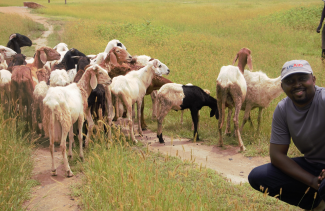The GHSA program is substantially contributing to the improvement of the capacity levels of the International Health Regulations (IHR 2005) to allow Cameroon to be well prepared to prevent, protect against, control, and provide a public health response to the international spread of diseases.
Cameroon is one of the 17 U.S GHSA partner countries. Through USAID, the Centers for Disease Control and Prevention (CDC), and the Department of Defense’s Defense Threat Reduction Agency (DTRA), the United States is committed to strengthening Cameroon's core GHSA capacities as well as the IHR capacities. In collaboration with the government of Cameroon, the U.S. government supports 14 technical areas identified in the GHSA framework: antimicrobial resistance (AMR), zoonotic disease, biosafety and biosecurity, National Laboratory System, surveillance, human resources, medical countermeasures and personnel deployment, risk communications and community engagement, emergency preparedness, emergency response operations, immunization, reporting, and points of entry. USAID focuses on the first eight of the 12 technical areas above through the mechanisms below:
The United Nations Food and Agriculture Organization/ Emergency Center for Transboundary Animal Diseases (FAO/ECTAD): Provides technical support to Cameroon's Ministry of Livestock, to increase animal health capacity to prevent, rapidly detect, and respond to zoonotic diseases shared between animals and people.
Africa One Health University Network (AFROHUN), formerly One Health Workforce/One Health for Central and Eastern Africa (OHW/OHCEA): Supports University partners, One Health ministerial departments, and the private sector to train current and future workforce across human, animal, and environmental health sectors.
The Community Preparedness and Pandemic (CP3) program: Led by the International Federation of Red Cross and Red Crescent Societies, CP3 strengthens epidemic and pandemic preparedness efforts through the engagement of civil-society, key stakeholders, the private sector, and the National Red Cross Societies as holistic approach for expanding coordination and response networks.
Medicines, Technologies, and Pharmaceutical Services (MTaPS) program: Responsible for the implementation of USAID's GHSA-supported antimicrobial resistance activities especially on antimicrobial stewardship activities and infection prevention and control (IPC) in health facilities. MTaPS strives to implement those activities in a One Health approach.
The Infectious Disease Detection and Surveillance (IDDS) program: Focuses on improving the detection of diseases of public health importance and on the identification and surveillance of antimicrobial resistance in priority infectious diseases.
Breakthrough Action: Implements Risk Communication and Community Engagement activities in the North and Far North regions of the country.
COVID-19 Response
The COVID-19 response funding supports the first two objectives of the American Rescue Plan Act (ARPA) which are: 1) Reduce morbidity and mortality from COVID-19, mitigate transmission, and strengthen health systems, including to prevent, detect, and respond to pandemic threats, and 2) Accelerate widespread and equitable access to and delivery of safe and effective COVID-19 vaccinations. The ARPA became Public Law in March 2021 with the goals of: (1) funding a comprehensive COVID response plan, (2) delivering relief to working families, (3) supporting communities that are struggling, and (4) protecting against future cyberattacks.
Breakthrough Action: Focuses on increasing acceptance and minimizing vaccine refusal through risk communication and community engagement (RCCE). Breakthrough Action is conducting surveys to understand vaccine acceptance among different demographic groups and geographic areas; developing strategies to address obstacles to vaccine acceptance among different demographic groups and geographic areas; and developing, reproducing, and disseminating materials to improve vaccine acceptance. Each approach will be tailored to the responses of different demographic groups
Infectious Disease Detection and Surveillance (IDDS): Supports timely, safe, specimen transport to ensure that COVID-19 specimens are properly referred and shipped to the designated laboratories through a safe and efficient transport system, and procures quality assured diagnostics and sample collection materials for the diagnosis of COVID-19.
International Federation of Red Cross and Crescent Societies (IFRC) Umbrella PIO Grant: Partners with National Red Cross Societies to implement risk communication, community engagement and health and hygiene promotion activities; ensures surveillance and case detection of COVID-19 cases at the community level and Reinforces infection prevention and control practices within communities.
Impact Malaria: Improves triage, diagnosis, and differential case management of fevers in health units' monitors COVID-19 activities through supervising the of using the revised Outreach Training and Supervision Support (OTSS) tool; supports quality control of sample collection,testing, and diagnostic capabilities of testing/reference laboratories; and supports infection prevention and control practices in supported-health facilities.
Medicines, Technologies, and Pharmaceutical Services (MTaPS): Scales up related infection prevention and control (IPC) in health facilities; trains health care workers and relevant stakeholders on IPC, and other technical assistance activities related to rolling out effective IPC programming; and provides technical assistance (as needed) in planning and forecasting for IPC commodities needed for COVID-19 prevention and response.
One Health Workforce-Next Generation (OHW-NG): Improves communication, advocacy and community engagement and demand within the University Network and neighboring communities. while also strengthening university e-learning capacities to improve risk communication, community engagement & infodemic management within the University Network for COVID-19.
United Nations International Children's Emergency Fund (UNICEF): Provides the operational costs for COVID-19 vaccination outreach activities to ensure equitable access and improves community engagement and demand for COVID-19 vaccination. UNICEF is also strengthening risk communication and community engagement (RCCE) through messages and guidance targeting parents/caregivers in at-risk communities and reinforcing an effective coordination mechanism for RCCE as an integral part of the national COVID-19 response structure; strengthening infection prevention and control (IPC) and water, sanitation and hygiene (WASH) in health facilities serving high-risk communities; and providing critical hygiene commodities and other USAID-approved supplies needed for COVID-19 prevention and response.

Christelle Ngueajio USAID/Cameroon
